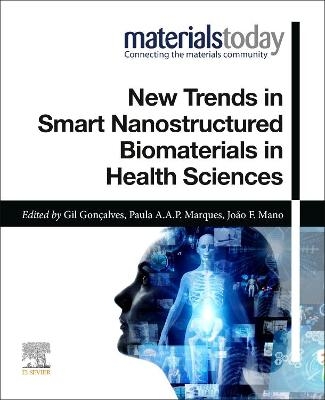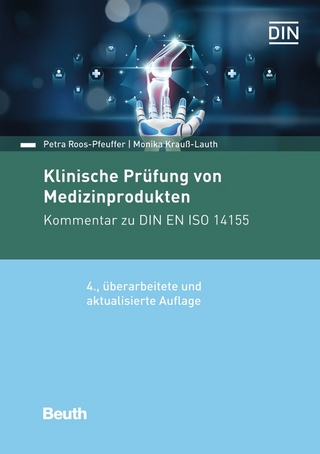
New Trends in Smart Nanostructured Biomaterials in Health Sciences
Elsevier - Health Sciences Division (Verlag)
978-0-323-85671-3 (ISBN)
Nanostructured smart materials have the special ability to respond to changes in the cell microenvironment, allowing for robust, biocompatible and rapidly adaptable, therapeutic and restorative action against a range of ailments. These materials are thus ideal candidates for use in tissue engineering and cancer therapy due to the varying nature of the cell microenvironment between persons, tissues and cancers. This book covers the design, synthesis, unique properties and application of smart biomaterials in these two key topic areas of tissue engineering and cancer therapeutics.
Gil Gonçalves received his PhD in Mechanical Engineering at the University of Aveiro with a thesis dedicated to nanocomposite materials for biomedical applications. He worked as a Researcher at the Institute of Material Science of Barcelona-High Council of Spanish Research (ICMAB-CSIC) under the Marie Sklodowska-Curie Actions. He was a short-term visitor on various occasions at University of Trieste and Laboratory of Applied Nuclear Energy (LENA, University of Pavia).Currently, he is working as Assistant Researcher at TEMA Centre for Mechanical Technology and Automation (Portugal), on the development of novel carbon-based nanocomposite materials with application in water remediation (Environment), three-dimensional graphene scaffolds for biomedical applications (Biomaterials), and carbon dots-based nanoplatforms for detection and therapy of cancer (Theranostic agents). Paula Marques graduated in Chemistry in the Universidade de Aveiro (UA) in 1993, completing her Master’s in Chemistry and Physics Teaching in 1997 and the PhD degree in Materials Science Engineering (Biomaterials specialization) in 2003 in the same institution. Paula’s research interests are the engineering and development of carbon-based nanostructured composites for health and environmental applications. She published +80 papers in international peer reviewed journals, seven book chapters, three books and has one patent registered and three requested. The quality of her work is expressed by the number of citations (+3800) and h-index of 33. Paula participated in 25 R&D projects with 9 in progress, being presently the coordinator of a H2020-FETOPEN project (A step forward to spinal cord injury repair using innovative stimulated nanoengineered scaffolds - No 829060). Paula is responsible for teaching the course “Carbon Nanostructures of the PhD program in Nanoscience and Nanotechnology, Technologies and Processes at Nano-Scale of the 5th year of Mechanical Engineering Master and is also supporting recurrent teaching activities in Materials Science Engineering. She has completed the supervision of 7 post-doctoral researchers, 5 PhD and 9 MSc, and is currently supervising 7 PhD and 2 MSc students. João F. Mano (CEng, PhD, DSc) is a Full Professor at the Chemistry Department of University of Aveiro, Portugal, where he is directing both the MSc and PhD programs of Biotechnology. He is the founder and director of the COMPASS Research Group, from the Associated Laboratory CICECO – Aveiro Institute of Materials. His research interests include the use of advanced biomaterials and cells towards the progress of transdisciplinary concepts to be employed in regenerative and personalised medicine. In particular, he has been applying biomimetic and nano/micro-technology approaches to polymer-based biomaterials and surfaces in order to develop biomedical devices with improved structural and (multi-)functional properties, or in the engineering of microenvironments to control cell behaviour and organization, to be exploited clinically in advanced therapies or in drug screening. João Mano is the Editor-in-Chief of Materials Today Bio (Elsevier). He has been coordinating or involved in many national and European research projects, including Advanced and Proof-of-Concept Grants from the European Research Council. João Mano is an elected fellow of the European Academy of Sciences.
SECTION 1 Smart nanostructured materials for oncology 1. Smart drug-delivery nanostructured systems for cancer therapy 2. Dendrimers and dendrimer-based nano-objects for oncology applications 3. Recent advances in tumors-on-chips 4. Application of smart materials in biosensors for cancer diagnosis
SECTION 2 Smart nanostructured materials for tissue engineering 5. Direct laser biofabrication of scaffolds for neural tissue engineering 6. Smart biomaterials and constructs for Bone tissue regeneration 7. Smart biomaterials for skin tissue engineering and health monitoring 8. Smart biomaterials and constructs for cardiac tissue regeneration 9. The fate of stem cells within smart biomaterials and constructs 10. 4D printing for tissue engineering of smart constructs 11. Bioactive glass nanofibers: synthesis and applications 12. Graphene: an ally for antibacterial biomaterial
| Erscheinungsdatum | 14.10.2022 |
|---|---|
| Reihe/Serie | Materials Today |
| Zusatzinfo | 150 illustrations (50 in full color); Illustrations |
| Verlagsort | Philadelphia |
| Sprache | englisch |
| Maße | 191 x 235 mm |
| Gewicht | 450 g |
| Themenwelt | Medizin / Pharmazie ► Physiotherapie / Ergotherapie ► Orthopädie |
| Technik ► Maschinenbau | |
| Technik ► Medizintechnik | |
| Technik ► Umwelttechnik / Biotechnologie | |
| ISBN-10 | 0-323-85671-3 / 0323856713 |
| ISBN-13 | 978-0-323-85671-3 / 9780323856713 |
| Zustand | Neuware |
| Informationen gemäß Produktsicherheitsverordnung (GPSR) | |
| Haben Sie eine Frage zum Produkt? |
aus dem Bereich


